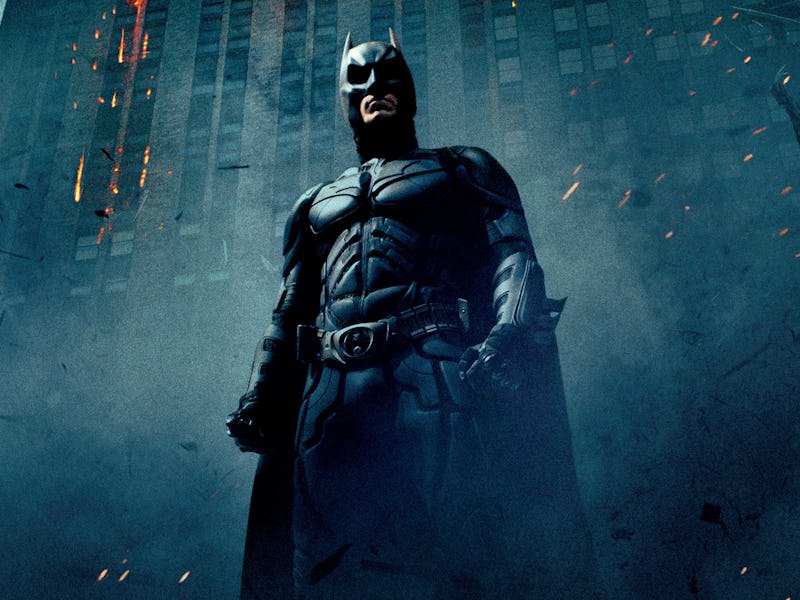Where Did DC Go Wrong After 'The Dark Knight', One Of The Greatest Superhero Films?
Ten years since Christopher Nolan directed Batman Begins and we're still dealing with it.

The Dark Knight is a fantastic film, and it remains the most critically acclaimed superhero film, even now, after years of studios attempting to recreate its magic. It succeeds as both a superhero film, and a poignant meditation on the cost of justice in the fight against evil. Christopher Nolan for his part juggles many different, and sometimes complicated ideas in his film including: corporate greed, government surveillance, and the moral fortitude of the everyday citizenry.
In many ways, The Dark Knight trilogy stands apart from the current wave of superhero films, despite inadvertently helping to start it. While its massive financial and critical success proved that superhero films could be bigger, more ambitious than the movies that preceded it, The Dark Knight is decidedly not a part of any larger cinematic universe. The three films in Nolan’s Batman trilogy are independent of the current DC films, and they’re becoming separated from the superhero genre as a whole.
The Dark Knight
Looking back on the Nolan Batman films in the context of the current wave of superhero movies, it seems to make sense to treat The Dark Knight as an exception to, rather than the cumulative peak of, superhero cinema. While The Dark Knight revealed that audiences weren’t so dumb as to be turned off by the intellectualism of the Nolan films, they also didn’t necessarily flock to it specifically for its nihilistic tone and atmosphere. This is demonstrated by the tepid reactions to Man of Steel and Batman v Superman.
Marvel for their part chose a different path. The current undisputed leader in superhero cinema opened up their cinematic universe with Jon Favreau’s Iron Man starring the perfectly cast Robert Downey Jr. It was the rock concert to The Dark Knight’s opera and two were perfectly comparable when they both hit theaters in 2008. One was bright and funny, the other dark and brooding.
Iron Man
Whether or not Marvel deliberately chose a deviating path from Nolan’s vision is debatable. In hindsight, Iron Man’s jovial tone mixed with explosive action seems perfectly in-line with the Marvel movies predating the MCU, including Sam Raimi’s Spider-Man 2 and Bryan Singer’s X-2. Both of those films managed to balance the fun nature of its characters with intense, sometimes violent, action.
The Dark Knight by contrast shares almost no discernible relation to the superhero movies that came before it. Nolan’s vision meant that all of Batman’s technology was rooted in real-world applications, the mysticism that sometimes appears in the Batman mythos is explained away as the result of drugs, and the villains are scaled so far back from their comic counterpart to be almost unrecognizable. For instance, neither Scarecrow or Catwoman are referred to by their comic book names. For being the definitive Batman film, The Dark Knight feels decidedly anti-comic book.
The departure between the previous batch of superhero films and the current wave, is that Marvel made Iron Man with the intention of building an entire universe around the film, rather than the next three Iron Man sequels. Once every film studio in Hollywood decided to hop aboard the concept of a cinematic universe, DC seemed to have doubled-down on the template left behind by Christopher Nolan’s Batman films.
Man of Steel
Man of Steel specifically felt like a Superman movie forced through the gritty sieve of The Dark Knight. Its failure to ignite confidence in the DC Cinematic Universe seems now less to do with the fact that director Zack Snyder couldn’t handle the material, but rather The Dark Knight may have been an exception for an audience that typically enjoys less brooding films.
The only metric available for this conclusion is based on critic reviews and ticket sales which have made the Marvel Cinematic Universe the juggernaut it is today. Regardless, it’s clear that between Marvel’s bright world full of quips and a dorky Spider-Man and a film where Batman screams his mother’s name as he is about gut Superman with a Krytonite spear, audiences decided they preferred the former.
The problem may have come from DC’s attempt to recreate the tone of a series of films that tried its best to avoid having any sort of “comic book” tone to begin with. In fact, DC appears to be increasingly set on righting their wayward ship. They’ve recently appointed Geoff Johns as co-head of its new DC Films division which will oversee the future DC Cinematic installments. What tone will he set for the future movies in a post-Batman v Superman world? We only need to look at his most recent comic book, Rebirth to find some answers. His desire to inject the DC universe with hope and reunion with its legacy is on full display in the new issue which sets up an epic confrontation within the DC universe between past and future.
Batman v Superman: Dawn of Justice
Coincidentally, the same mission statement could apply to DC’s film which, since The Dark Knight seemed to have lost connection to its legacy. Instead DC built a series of films on Nolan’s exceptional, but one-off template. It turned out that The Dark Knight can be a great film and not be a great example to follow, as Zack Snyder’s choice to intensify the visual panache and grim darkness of DC Heroes fails to connect with viewers.
It’s difficult to name a superhero film that feels like a spiritual successor to Nolan’s Dark Knight that turned out to be a huge success. So far, every superhero film that followed in Nolan’s dark shadow has turned out less than stellar, from Man of Steel to Fox’s recent Fantastic Four reboot. Going forward The Dark Knight might end up a footnote in the history of superhero cinema, rather than a key chapter within it.